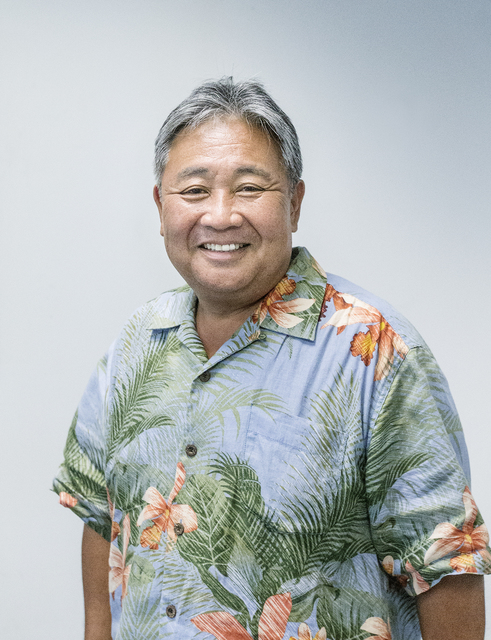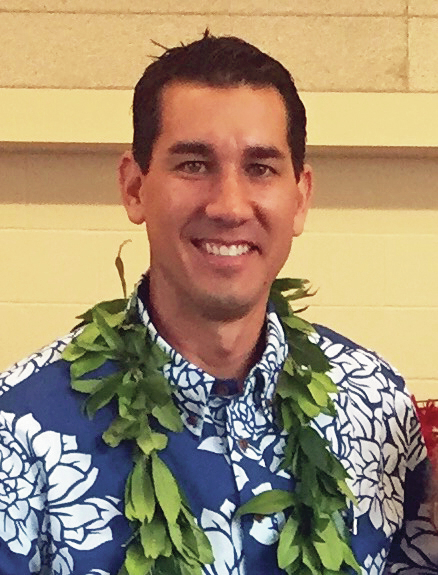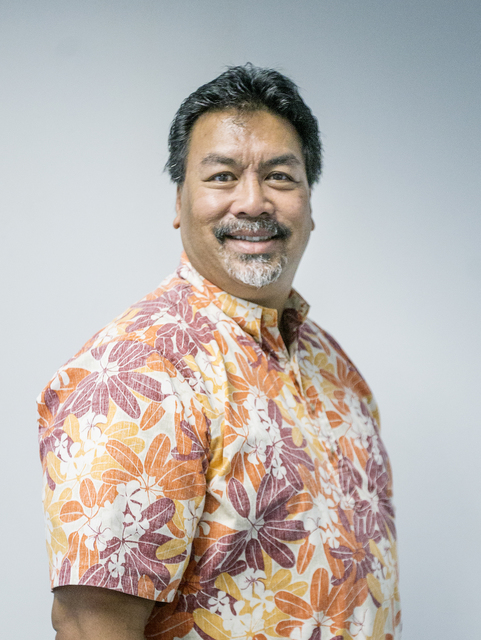State Senate campaigns civil, contentious: Confident Kahele faces experienced, novice challengers in District 1
HILO — In February, the decision was up to Gov. David Ige.
Now, it’s time for Hilo voters to decide who will be their state senator.
The District 1 seat is up for grabs after the death of Sen. Gil Kahele last January at age 73.
His son, Kai Kahele, was appointed to fill the vacancy and the freshman Democratic senator is looking to continue his father’s legacy and cement his own.
Kahele
He faces challenges in the Aug. 13 Democratic primary from Hawaii County Councilman Dennis Onishi and Kaloa Robinson, a housing specialist with the county Office of Housing and Community Development. The winner will face Libertarian Kimberly Arianoff in the Nov. 8 general election.
Kahele, 42, said he saw the appointment as an honor and an opportunity to get his feet wet during the last legislative session. But his real test will come in the primary.
“I always said this election is when Hilo gets to vote,” Kahele said. “This election is when the people of Hilo get to speak.”
Kahele said he was immersed in politics at a young age and helped his father campaign for other Democrats, including former Gov. Neil Abercrombie while he was running for Congress.
As governor, Abercrombie would later appoint Gil Kahele to the Senate in 2011 to fill another vacancy. Gil Kahele won the 2014 election to keep the seat.
“I was born into this,” Kai Kahele said. “My dad made sure I was always involved.”
His first career took him into the skies. Kahele is a Hawaiian Airlines pilot and flew missions in Iraq and Afghanistan with the Hawaii Air National Guard.
“I’ve seen things people will never see in their lifetimes,” he said. “I’ve led teams, I’ve led combat missions.”
But Kahele also has come under fire for holding a state lease for a home in Milolii that requires him to use it as a primary residence.
The low-cost leases were provided in the 1980s to families displaced by the 1926 lava flow.
He said he took it over in 2011 from an aunt who was ill in order to keep it in the family. She died a few months later.
Kahele, whose family is from the area, continued to live in Hilo. He said he used the house occasionally while he ran the nonprofit Pa‘a Pono Miloli‘i.
But he acknowledges he knew he was supposed to use that home as his primary residence. Kahele said he did what he thought was right at the time. As a state senator, he said he would likely make a different decision.
The lease came under scrutiny after his appointment. Kahele assigned the lease to another relative who intends to reside there.
“I was spending time in Milolii,” Kahele said. “At the same time, this was a family that needed help. Sometimes life isn’t black and white.”
As senator, he said his priorities are to grow the economy, with an emphasis on promoting tourism, redeveloping Lanakila housing and agriculture. He said he also wants to get counties a greater share of transient accommodation tax.
Regarding tourism, he said he is a big supporter of Banyan Drive redevelopment and would like to see trails connecting Hilo pier, where cruise ships dock, with downtown.
To encourage more people to farm, Kahele said he wants the state to provide low-cost leases and loans to farmers.
Kahele also proposed bringing an aviation school to Hilo.
A bill signed by his father that would have appropriated money for the school died during the session.
That was one of three bills Gil Kahele signed hours before his death in January. The other two would have established a state airport authority and preserve lands at Kapua Bay.
Kahele, who was appointed after the deadline for introducing legislation, made the bills his priority but none of them got through the session. He said he was at a disadvantage since everyone else knew what he wanted.
“It’s like playing poker,” Kahele said. “Once you know what I have it’s over, man.”
For legislative successes, he noted ensuring the $31.3 million for construction of University of Hawaii at Hilo’s Pharmacy College was appropriated and securing $89 million in capital funds for the district.
Asked how he is different from his father, Kahele said he is a “Type A” personality. He described himself as a go-getter and appeared energetic and confident during an interview.
Or, to put it in his own words: “I’m hungry. I’m passionate. I’m an animal, man.”
Onishi
Onishi, who is completing his last term as a Hilo councilman, is seen as Kahele’s strongest challenger.
Onishi, 55, of Hilo said initially his brother, state Rep. Richard Onishi, was going to run for the Senate seat.
He said his brother chose instead to seek re-election to the House so he threw his hat in the ring on the last day of candidate filing.
Onishi said his eight years on the council, plus holding leadership roles in the Hawaii State Association of Counties, that lobbies state government on behalf of the counties, makes him the most qualified candidate.
He said his three goals are: getting the counties a bigger share of the transient accommodations tax, curbing domestic violence and fighting invasive species.
For the latter, he said, “We need to stop that Honolulu-centric kind of thinking.”
Onishi said he has asked Ige to declare a state of emergency for rapid ohia death and would push for that as a senator. It’s not clear if that has been done before for a plant disease, but he said he thinks it could allow more federal dollars to be spent combating the blight that is devastating native forests.
“Can you imagine what this island would be without ohia trees?” Onishi said. “It’s not going to be Hawaii anymore.”
He said he supports the Hilo-based Pacific International Space Center for Exploration Systems, that he hopes will help attract more high-tech jobs to the area. The aerospace agency has struggled to get enough funding from the state.
“We need to be more proactive on trying to get better-paying jobs,” Onishi said.
He said he would support bringing UH’s astronomy program to Hilo, which is headquartered at UH-Manoa.
Onishi said he also would like to see the Department of Hawaiian Home Lands restructured to make it more accountable to the beneficiaries. He said the head of the department should be elected by leaseholders rather than be appointed.
“To me, sometimes they lose focus of what their role is, their focus is,” Onishi said of the department.
As a councilman, he said he is most proud of getting funding to build the Haihai Street fire station and for a crew to combat little fire ant infestations at county facilities.
Robinson
Robinson, 51, of Hilo started his career in politics working as a staffer for former Sen. Daniel Akaka in Washington, D.C.
He said he became interested in politics to give Native Hawaiians more of a voice.
“I always felt the reason I became a political science major was because I just felt there was a disconnect with what was happening in government,” Robinson said, adding too many decisions on issues facing Hawaiians were being made by non-Hawaiians.
He said his current job involves addressing the county’s homeless issue, including developing microunits in West Hawaii.
Robinson said homelessness and affordable housing are his big issues.
“What we want to do is really implement a model of housing first,” he said. “First thing to do is get them sheltered.”
Robinson said he worked on Kamakoa Nui Workforce Housing, which the county developed.
The lots are sold fee simple but at a rate that is more affordable, he said. The county provided the infrastructure.
Robinson said he would like to see the Hilo economy become more diverse and proposed starting a physical therapy school at UH-Hilo. He said Hilo also could host a “world-class cancer center.”
Robinson said he is a four-year cancer survivor.
He described himself as the most “seasoned” candidate. His other work experience includes Hilo Medical Center, Puna Geothermal Venture and staff member for Ben Cayetano when he was lieutenant governor.
“I’ve worked for every level of government,” Robinson said.
Arianoff
When voters go to the polls in November, they will have another option.
Arianoff, the Libertarian candidate, is running on a platform of smaller, more responsive government.
She’s also running to give voters another choice.
The party’s tagline, Arianoff said, is “legalize freedom.”
“That’s my biggest point,” she said. “Allow people to make choices for themselves. … Do what you are going to do, just don’t infringe on someone else’s rights.”
Arianoff, 47, said she was raised in Hilo and moved here from the mainland to raise a family.
She said she would like to see the state Department of Education decentralized to give more control to local communities and teachers.
“Our education system is top-heavy,” Arianoff said.
Overall, she said the state government should be smaller and more supportive of small businesses.
“Our government and tax dollars should not be spent as an employment agency,” Arianoff said.





